- Home
- Elmore Leonard
The Big Bounce jr-1 Page 16
The Big Bounce jr-1 Read online
Page 16
Very sloftly, barely taking his mouth from hers, he said, “Close your eyes.” He kissed her cheek. Her eyes closed and opened and closed again and he kissed her eyelids, came down her nose and fooled around a little at the corner of her mouth and then on her lower lip, the old left hand working up there again under her arm, the cushion of his thumb moving in closer, yes, just starting to touch-and she jumped, she winced, opening her eyes.
Still softly, close, holding on, Ryan said, “What’s the matter?”
“I have a little sore there,” Virginia murmured. She sounded half asleep, drugged.
“A sore?”
“From my bathing suit. It rubs.”
“Aww, I’m sorry.” He eased his hand away, working it across her back, his fingers touching gently until he found the zipper of her dress. He began pulling it down and could feel her bare skin as it came open. She didn’t seem aware of what he was doing until her dress was open to her waist. His hand went in to rest on the curve of her hip and her eyes, inches away from him, snapped open.
“Don’t.”
“Don’t what?”
She didn’t speak. She didn’t move. She kept staring at him.
“Did I hurt you again?”
“Please don’t.”
“Don’t what?”
She kept looking at him.
“Just tell me why not?” Ryan whispered, gentle and patient.
Her voice was low, but very clearly she said, “Because it’s a sin.”
“What do you mean, a sin?”
“It’s a sin.”
“A sin-what are we doing?”
“You know what we’re doing,” Virginia said.
“It’s natural. I mean it’s the way we are-”
“If you’re married,” Virginia Murray said.
“We’re just fooling around.” Ryan smiled at her.
“To me it’s a sin.” Virginia hesitated before adding, in a hushed tone, “I’m a Catholic.”
“Well, that’s all right,” Ryan said. “So am I.”
“You are not.”
“I am. Honest to God.”
“Say the Apostles’ Creed.”
“Aw, come on.”
“If you’re a Catholic, you know the Apostles’ Creed.”
“O my God I’m heartily sorry-”
“That’s the Act of Contrition!”
“I believe in God, the Father Almighty,” Ryan said. “Creator of heaven and earth-come on, what is this?”
“Will you get off me, please?”
“For Christ sake, you started it.”
“Please don’t use that language.”
“You parade around without any pants on.”
Virginia pulled away from him, turning out of his arms, and put her hands over her face. Her hands muffled the words as she said, “Please leave.”
“What?”
“Leave!”
“God, you think I’m going to stay?” Ryan pushed up from the bed and straightened his pants. “I think,” Ryan said, “you ought to make up your mind, that’s all.”
“I thought you’d come back last night,” Nancy said.
Ryan was driving the Mustang. He glanced at her and brought his gaze back to the road. They had passed through Geneva Beach and were coming out on the highway south, out of tree shade into open sunlight. “I wanted to,” Ryan said, “but he was still hanging around.”
“So?”
“I mean he was watching.”
“So what if he was?”
“I didn’t want him asking any questions.”
“Are you afraid of him?”
Ryan glanced at her again. “No, I’m not afraid of him-why should I be afraid?”
“I love his house,” Nancy said. “God.”
“He likes it.”
“He’s the justice of the peace,” Nancy said. “Did you know that?”
“He told me you’re going to appear in his court.”
“I can hardly wait.”
“What’d you do it for? Run the two guys off the road.”
“Because they were asking for it, I guess.”
“You could have killed them.”
“I’ll have to decide how to handle your friend at the hearing,” Nancy said. “Should I be the sweet little girl or try to impress him?”
“I don’t know,” Ryan said. “I’ve never seen him in court. Is Ray getting you a lawyer?”
“I suppose so. We haven’t discussed it.”
Off the highway, on the gravel road now, the Mustang trailed a mist of dust that rose and thinned to nothing in the sun glare. On both sides of the road the fields stretched flat and empty to distant trees.
“This has all been picked,” Ryan said. “They’re working down a ways toward Holden now and I sure hope Bob Junior’s with them.” He let the Mustang crawl along, the gravel rattling against the car’s underbody.
“Way over there”-Ryan pointed. “There’s some pickers.” He waited until they were a little farther up the road, coming even with the pickers. “See how you straddle the row? These people are the only ones who can work bent over like that all day.”
“You did it,” Nancy said.
“I like to broke my back. After the first day I thought I’d have to quit. I guess you have to be raised a picker to be any good. Billy Ruiz, little half-pint of a guy, he’ll outpick anybody.”
They moved along the ruts, Ryan squinting out at the field lying still in the August heat and at small groups of figures, far out, working slowly along the rows but appearing to be standing in one place.
“They got to get the crop in this week,” Ryan said. “A few more days and they’re too big for pickles and all you’ve got are cucumbers-”
“I love pickle facts,” Nancy said.
Ryan looked at her. “Have you ever thought about it?”
“All the time.”
“If the grower can’t get enough pickers, I mean, good pickers to get his crop in on time, he loses his shirt. That’s why he needs the migrants.”
“I love farm labor facts, too.”
The Mustang approached the barn and outbuildings and beyond them the row of one-story buildings that were weathered a clean gray and stood in the open like a deserted Army post left to rot. As they drew closer there were signs of life: the clothes hanging on the lines and the sound of children playing.
The children, in the worn, hard-packed field next to the barn, stood for a moment watching the Mustang, then came running after it, yelling in a mixture of English and Spanish. A woman in a T-shirt and blue jeans stood in the doorway of her home; another sat on a turned-over washtub wearing a man’s straw hat. There were women in the shade of the washhouse and a woman in the open sunlight, half turned, motionless, her arms raised to the clothesline of faded denim and khaki, her gaze following the Mustang and the children running in its dust.
Ryan could hear the children and could feel the gaze of the women. He said to Nancy, “See that, like a tool shed? That’s where I lived, three of us in there.”
“Nice.”
“I don’t know. It really wasn’t so bad,” Ryan said. “It’s true what you hear about migrant camps, the awful way the people live. But when you’re living here, I mean everybody in it together, you get used to it and laugh at different things and it really isn’t so bad. We’d play ball in the evening or a guy would get his guitar out and, you know, everybody would sing.”
“Sounds like fun,” Nancy said.
Ryan looked at her. “All right, it wasn’t fun, but it wasn’t so bad, either.”
“Are you ready?” She was pouring Cold Ducks into a stem glass. She had brought the bottle in a bag of crushed ice and two glasses.
“Not right now,” Ryan said.
The road curved out of the camp area and made a little jog and seemed to narrow with the trees closing in on both sides. About a hundred yards up the road they came to Ray’s place. It was in a clearing with a circular drive leading in and out, a two-story farmhouse
that had been faced with green-stained logs and converted into a hunting lodge.
Nancy said, “Have you been inside?”
“No, this is the closest I’ve been.”
“He has deer heads and Indian blankets on the walls.”
“Well, it’s a hunting lodge,” Ryan said.
He turned into the drive and followed it in low gear as he studied the place. The drive was empty and the place looked deserted; still, he kept going, following the curved drive out again to the road.
Nancy was watching him. “You didn’t give it much of a look.”
“I want to see if we can get up behind it,” Ryan said.
He saw the sign down the road before he was able to read it. The sign was on the right, a painted board pointing across the road into the woods. Ryan wasn’t looking for a sign and it didn’t mean anything to him until they were close enough to read it-ROGERS-and then he remembered Mr. Majestyk telling him about the place up in the woods that would be perfect for a hunting lodge, his plan to have a couple of big A-frames stuck together with a central heating unit; that was it.
As he turned left into the dirt road Nancy said, “Now where?” She must have seen the sign, but that was all she said.
“This ought to get us up there,” Ryan said.
It was a dirt road with deep ruts, narrow and winding, so narrow in places the brush and tree branches scraped the sides of the car. They moved slowly, the springs squeaking and the flat shape of the hood out in front of them rising and dipping through the chuckholes. The road began to climb, curving into switchbacks, the trees high overhead, quiet in here and dim, with patches of sunlight and glimpses of sky up through the branches. All the way up neither of them spoke, not until they were at the top and the road opened up, ending in a cleared area, and Nancy said, “Well, now that we’re here.”
God, it was quiet, a quiet you could feel. Ryan’s door slammed loud and he stood there after he got out. Then moving and hearing only the sound of his shoes in the leaves. It was a good-sized area; it had been cleared and people had been here. He noticed a few rusted beer cans and a brown whiskey bottle and bits of paper around. Some people knew where it was, but God, it was quiet and away from everything. The only woods he had ever been in were in Detroit, in Palmer Park and on Belle Isle, and in those woods you could always hear people outside of the woods having a picnic or playing baseball. He had never been in real north-country woods.
“Now what?” Nancy said.
He didn’t answer her. He walked around, over to one side of the clearing that looked down on a lake, a narrow curved lake that sat down there by itself with thick trees growing up from its banks. He walked along the edge of the clearing, looking down into dense woods that you would have to cut your way through, to the other side, and here through an opening he could see the hunting lodge and beyond it part of the cucumber fields and the migrant camp, way down there far away, the buildings neat and orderly in the sunlight and edged with clean shadow lines. He could see the junk-heap cars back of the buildings and a little square of yellow, Luis Camacho’s bus.
God, with about a hundred and twenty thousand miles on it.
“You can see the camp,” Ryan said.
Nancy was still in the car, about twenty feet away. She said, “Really?”
“Come here, you can see it good. There’s the bus we rode up in.”
“Some other time,” Nancy said.
“I don’t know how that bus ever made it. It was the craziest ride I ever took. I mean, it wasn’t like a bus ride, it was like living on a bus for four days.” Ryan looked toward her, then walked over. “I’ll have one now.”
She poured Cold Duck into a glass and handed it to him. Ryan held it up, looking at the dark red color, and smiled.
“It reminds me of Billy Ruiz; he always drank rock and rye. You ever taste it? It’s awful.”
“Pop?”
“Terrible. It’s got a reddish color.” Ryan smiled again, looking at the stemmed glass. “He was always holding it up to see how much he had left. He’d be eating a lunch stick or something, take a bite, take a swallow, and then hold the bottle up and look at it, trying to make them come out even. It reminded me of that.”
“Let’s go,” Nancy said.
Ryan had turned from the car. He was looking off into the trees, in the direction of the migrant camp.
“I don’t know,” he said. “The way they live and all, they always seem to get along. They don’t really bitch about anything, they kid about it. I mean, I think of them as being pretty happy. I don’t mean simple, fun-loving folk, you know-”
“No,” Nancy said. “What do you mean?”
Ryan looked at her now. “I mean, they can take it. Maybe they take more than they should, I don’t know. But even living the way they do, they still have something not many people have.”
“I know,” Nancy said. “Dignity.”
“Forget it.”
“How about nobility?”
Ryan finished his drink, trying to do it calmly.
“Come on, I want to know.”
“Go bag your ass,” Ryan said.
She smiled and started to laugh, then put her head back and laughed louder. Ryan watched her. Something was strange and he kept watching her until he realized what it was. In the three days he had known her this was the first time he had heard her laugh.
A fellow by the name of A. J. Banks, from the Growers Association, called Bob Jr. and asked him what it would cost to have the labor camp torn down and hauled away so they could plant that whole area next season. Bob Jr. said he wasn’t a wrecking company, why ask him? And A. J. Banks said if he could build it, goddamnit, he could estimate tearing it down, couldn’t he? Bob Jr. said he’d look it over and see what he thought. That’s why he drove up to the camp and would have sworn he saw Nancy’s Mustang heading out the back road as he reached the migrant buildings. Maybe not.
But maybe it was her car. After he looked over the buildings and got an idea how many truckloads it would take to haul the lumber away, he drove out the back road. Her car wasn’t at Mr. Ritchie’s lodge. Beyond the lodge the road didn’t lead anywhere; it cut through pastureland and woods and finally reached the lakeshore about fifteen miles from Geneva Beach. Bob Jr. hadn’t been back here since spring, since they decided to sell the woods property and he put the sign up on the road. Once in a while somebody, like Mr. Majestyk, would look at the property, but usually the only ones who came by were kids looking for a place to make out. The tire tracks could be anybody’s; old ones. But then he remembered it had rained the day before yesterday.
When he saw the good clean impression of the tracks turning into their private road, he knew somebody had been back here recently. He wasn’t thinking of Nancy now. He’d decided it couldn’t have been her car he’d seen. But he was curious about the tire tracks. That’s why he shifted into first and headed the pickup truck up the private road.
The first thing Ryan did when he saw the pickup, hearing it first and knowing it right away as it came out of the trees, he placed his glass on the hood of the Mustang and looked around. He wasn’t trying to be casual about it, but he wasn’t hurrying either. He spotted a tree limb on the ground, over just a little way, and by the time Bob Jr. was out of the pickup, Ryan had snapped off a branch the size of a broom handle and stood resting on it in his spearman pose.
In the car, holding her glass, her arm resting on the doorsill, Nancy said, “Hi, Bob,” and waited to see what would happen.
Bob Jr. looked over the situation. He saw Nancy and the empty glass on the hood and out beyond the car Jack Ryan holding his staff or club or whatever the hell it was. They were both waiting for him to do something, like it was up to him to make the next move. Ryan was standing there asking for it and that part of it was simple: he’d told Ryan to leave and Ryan was still here, so he’d have to teach him a lesson. But with Nancy watching, he’d have to make it look easy, like this bird wasn’t any trouble at all. Bob Jr. took off
his cowboy hat and his sunglasses and put them in the truck, through the window.
“Bob,” Nancy said, “do you want a Cold Duck?”
“Not just now,” Bob Jr. said. He glanced at her. “What’re you doing out here?” As he said it, it didn’t sound right to him.
“I don’t know,” Nancy said. “He brought me.”
“Has he bothered you any?”
“Let’s see-no, he hasn’t really bothered me.” She was having fun.
“A ball bat or a stick,” Bob Jr. said, staring at Ryan again. “You got to have something in your hand, don’t you?”
Ryan didn’t answer. He stood waiting.
“Tough guy if he’s got a club in his hand. Hey, boy, don’t you want to fight fair?”
Ryan frowned now. He said, “Fair? What is this, the goddamn Golden Gloves?”
“A man fights with his fists,” Bob Jr. said.
“Yeah, well you come at me, buddy, and I’ll hit you with the heaviest thing I can find.”
“I got a tire iron in the truck,” Bob Jr. said. “Maybe I better get it.”
“If you did,” Ryan said then, “and we started swinging at each other, tell me something, what would we be fighting about?”
“Because you think you’re a tough boy and think you can take me.”
“Did I ever tell you that?”
“You didn’t have to. I know your smart-ass type the minute I see it.”
Ryan kept studying him. “You really want to fight, uh?”
“You got something coming,” Bob Jr. said.
Ryan looked at Nancy then and said, “Tell him he doesn’t have to.”
She was watching Ryan. “It’s not up to me.”
“Tell him anyway.”
“Leave her out of it,” Bob Jr. said.
Ryan shook his head. “Boy, you must be awful dumb or something. She wants a fight, don’t you see that?”
“And you want to get out of it,” Bob Jr. said.
It was coming now and Ryan knew it. Every time he had ever been in a fight since he was little, he knew this time when his stomach tightened and he could see in the other guy’s eyes they were going to go through with it. He had thought about it a lot, this moment, and he had come to realize that the other guy must be feeling and thinking the same thing, and no matter how big the other guy was, he would probably be afraid or tightened up or nervous, because nobody could ever be a hundred percent sure. This moment, Ryan had decided, when they weren’t quite ready, was the time to hit them. Hit first and hit hard and maybe end it right there.

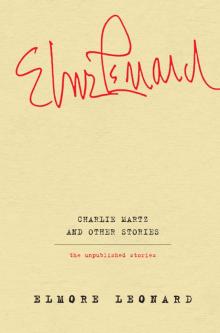 Charlie Martz and Other Stories: The Unpublished Stories
Charlie Martz and Other Stories: The Unpublished Stories Elmore Leonard's Western Roundup #2
Elmore Leonard's Western Roundup #2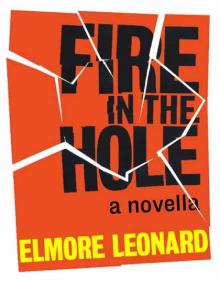 Fire in the Hole
Fire in the Hole Tishomingo Blues (2002)
Tishomingo Blues (2002)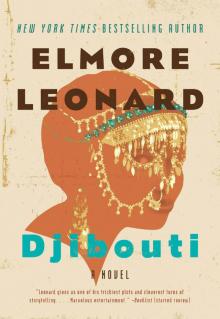 Djibouti
Djibouti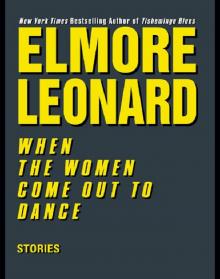 When the Women Come Out to Dance: Stories
When the Women Come Out to Dance: Stories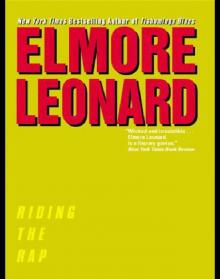 Riding the Rap
Riding the Rap Moment of Vengeance and Other Stories
Moment of Vengeance and Other Stories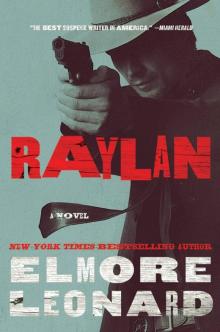 Raylan
Raylan Touch
Touch Mr Majestyk
Mr Majestyk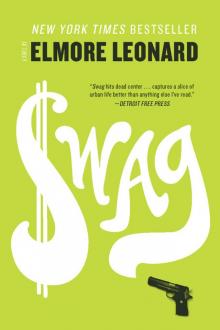 Swag
Swag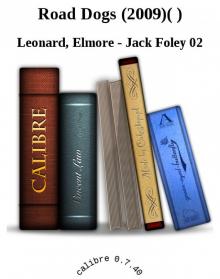 Road Dogs
Road Dogs La Brava
La Brava The Hot Kid
The Hot Kid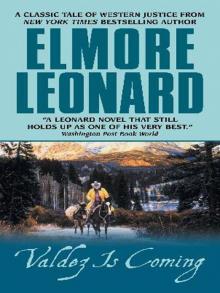 Valdez Is Coming: A Novel
Valdez Is Coming: A Novel Be Cool
Be Cool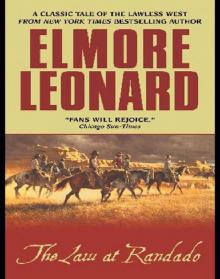 The Law at Randado
The Law at Randado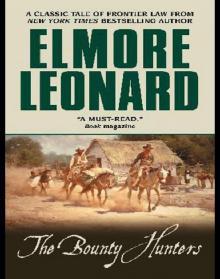 The Bounty Hunters
The Bounty Hunters When the Women Come Out to Dance
When the Women Come Out to Dance 310 to Yuma and Other Stories (1953)
310 to Yuma and Other Stories (1953)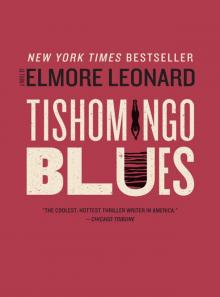 Tishomingo Blues
Tishomingo Blues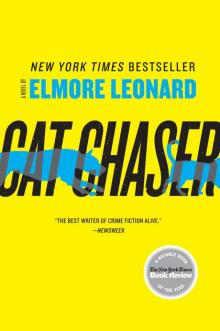 Cat Chaser
Cat Chaser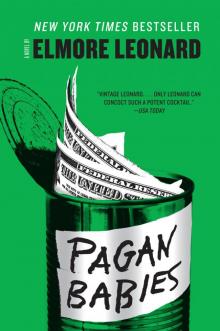 Pagan Babies
Pagan Babies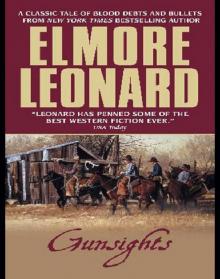 Elmore Leonard's Western Roundup #1
Elmore Leonard's Western Roundup #1 52 Pickup
52 Pickup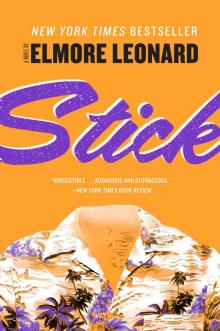 Stick
Stick The Moonshine War
The Moonshine War Valdez Is Coming
Valdez Is Coming City Primeval
City Primeval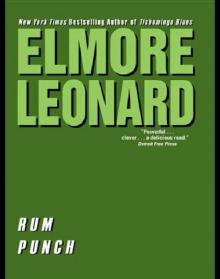 Rum Punch
Rum Punch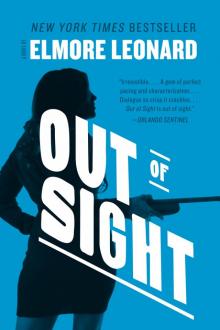 Out of Sight
Out of Sight Naked Came the Manatee (1996)
Naked Came the Manatee (1996)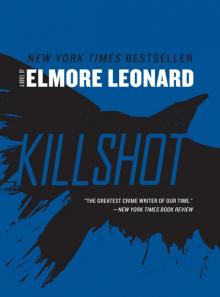 Killshot
Killshot Cuba Libre
Cuba Libre Forty Lashes Less One
Forty Lashes Less One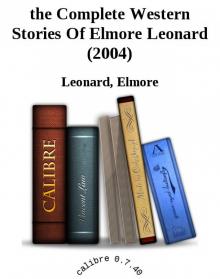 The Complete Western Stories of Elmore Leonard
The Complete Western Stories of Elmore Leonard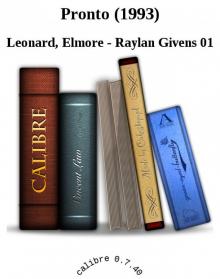 Pronto
Pronto Split Images
Split Images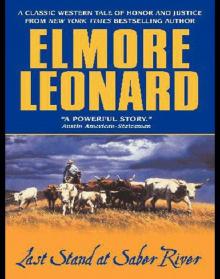 Last Stand at Saber River
Last Stand at Saber River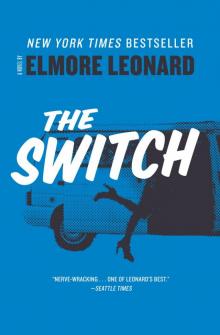 The Switch
The Switch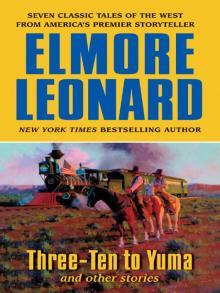 Three-Ten to Yuma and Other Stories
Three-Ten to Yuma and Other Stories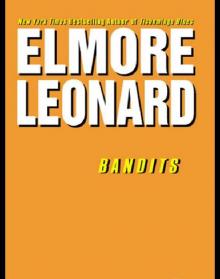 Bandits
Bandits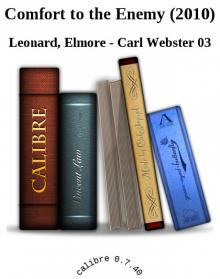 Comfort to the Enemy and Other Carl Webster Stories
Comfort to the Enemy and Other Carl Webster Stories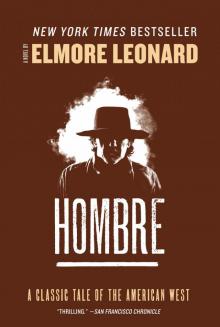 Hombre
Hombre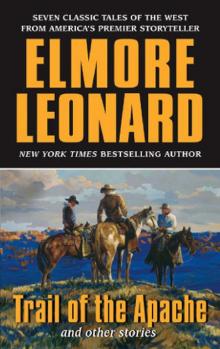 Trail of the Apache and Other Stories
Trail of the Apache and Other Stories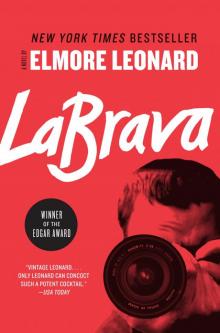 LaBrava
LaBrava Gold Coast
Gold Coast Jackie Brown
Jackie Brown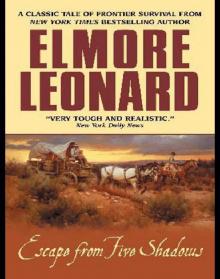 Escape From Five Shadows
Escape From Five Shadows Karen Makes out (1996)
Karen Makes out (1996)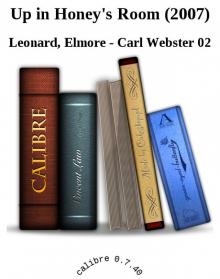 Up in Honey's Room
Up in Honey's Room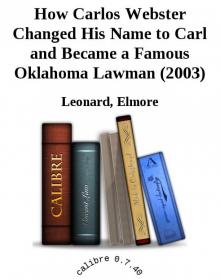 How Carlos Webster Changed His Name to Carl and Became a Famous Oklahoma Lawman (2003)
How Carlos Webster Changed His Name to Carl and Became a Famous Oklahoma Lawman (2003)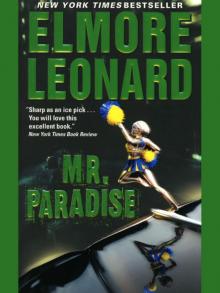 Mr. Paradise
Mr. Paradise The Hunted
The Hunted Freaky Deaky
Freaky Deaky Louly and Pretty Boy (Ss)
Louly and Pretty Boy (Ss)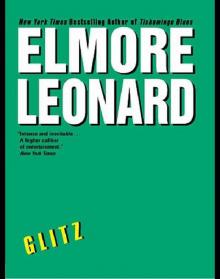 Glitz
Glitz A Coyote's in the House
A Coyote's in the House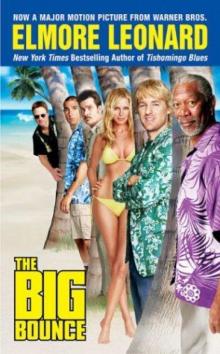 The Big Bounce jr-1
The Big Bounce jr-1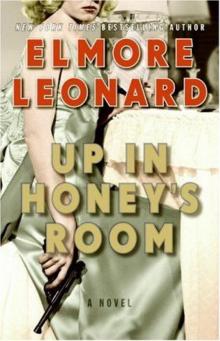 Up in Honey's Room cw-2
Up in Honey's Room cw-2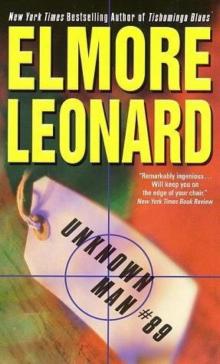 Unknown Man #89 jr-3
Unknown Man #89 jr-3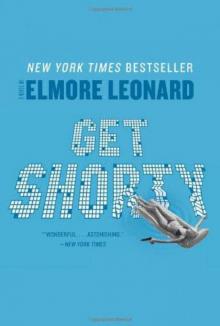 Get Shorty: A Novel cp-1
Get Shorty: A Novel cp-1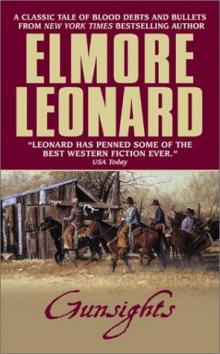 Gunsights
Gunsights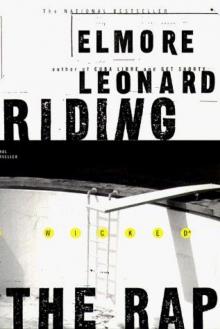 Riding the Rap rg-2
Riding the Rap rg-2